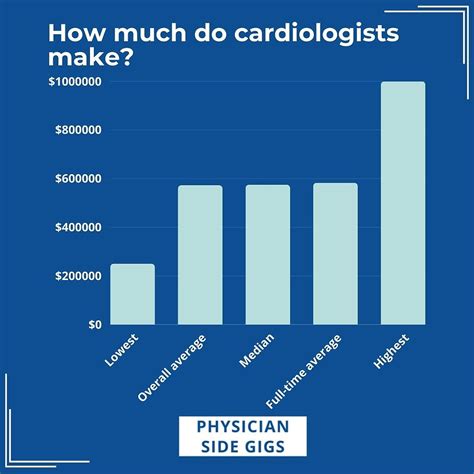Introduction

Cardiology, a specialized branch of medicine focusing on the heart and its diseases, is a highly sought-after profession known for its challenging and rewarding nature. With an ever-growing demand for skilled cardiologists, it’s essential to explore the financial aspects of this career path. This guide delves into the intricacies of average cardiologist salary, considering various factors that influence compensation and providing a comprehensive overview of this crucial topic.
Average Cardiologist Salary
According to the American College of Cardiology (ACC), the average cardiologist salary in the United States is estimated to be around $255,000 per year. However, this figure can vary significantly based on several factors, including:
- Experience: As cardiologists gain more experience, their earning potential typically increases.
- Specialization: Cardiologists who specialize in specific areas, such as interventional cardiology or electrophysiology, may earn higher salaries.
- Location: Salaries for cardiologists tend to be higher in large metropolitan areas and states with a higher cost of living.
- Practice Setting: Cardiologists working in private practice generally earn more than those employed in hospitals or academic institutions.
Factors Influencing Cardiologist Salary
In addition to the factors mentioned above, several other variables can influence cardiologist salary:
- Education and Certification: Cardiologists with advanced degrees and board certifications typically command higher salaries.
- Insurance and Medicare Reimbursement Rates: Changes in insurance policies and Medicare reimbursement rates can impact cardiologist earnings.
- Technological Advancements: The development and adoption of new technologies can both increase and decrease the demand for cardiologists.
- Market Demand: The supply and demand for cardiologists in a particular location can affect salaries.
Common Mistakes to Avoid
Aspiring cardiologists should be aware of certain pitfalls to avoid when negotiating their salaries:
- Underselling their Value: Cardiologists with strong skills and experience should not underestimate their worth.
- Accepting a Salary that is Too Low: It’s crucial to research comparable salaries in the market and advocate for fair compensation.
- Not Negotiating Benefits: In addition to salary, cardiologists should negotiate benefits such as health insurance, retirement plans, and continuing education opportunities.
- Ignoring the Contractual Details: It’s important to carefully review the terms of employment contracts before signing to ensure they align with expectations.
Tables and Statistics
The following tables provide additional insights into cardiologist salaries:
| Year | Average Cardiologist Salary | Source |
|---|---|---|
| 2021 | $255,000 | American College of Cardiology (ACC) |
| 2020 | $248,000 | Medscape |
| 2019 | $240,000 | Bureau of Labor Statistics (BLS) |
| Location | Average Cardiologist Salary | Source |
|---|---|---|
| New York, NY | $320,000 | Indeed |
| San Francisco, CA | $310,000 | ZipRecruiter |
| Dallas, TX | $270,000 | Salary.com |
| Specialization | Average Cardiologist Salary | Source |
|---|---|---|
| Interventional Cardiology | $290,000 | ACC |
| Electrophysiology | $280,000 | ACC |
| Non-Invasive Cardiology | $240,000 | ACC |
FAQs
- What is the career outlook for cardiologists? The demand for cardiologists is expected to grow by 11% over the next decade, according to the BLS.
- How can cardiologists increase their earning potential? Specializing, obtaining additional certifications, and negotiating effectively can all boost salaries.
- What are the benefits of working as a cardiologist? Cardiologists enjoy job security, a high earning potential, and the ability to make a meaningful impact on patients’ lives.
- What is the educational path to becoming a cardiologist? After graduating from medical school, aspiring cardiologists must complete a three-year residency program in cardiology and obtain board certification.
- What are the challenges of working as a cardiologist? Cardiologists face demanding work schedules, extended hours, and the emotional toll of dealing with serious health conditions.
- How can cardiologists manage the stress of their work? Maintaining a healthy work-life balance, seeking support from colleagues, and utilizing stress management techniques are crucial for cardiologists’ well-being.
